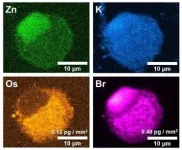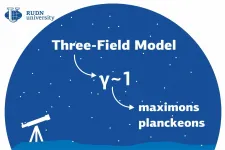More sustainable recycling of plastics
Chemists at the University of Konstanz have developed a method for more sustainable recycling of polyethylene-like plastics
2021-02-17
(Press-News.org) The new method works without extremely high temperatures, is therefore more energy-efficient and has a significantly higher recovery rate (approx. 96 per cent of the starting material) than established processes. These findings will be published on 17 February 2021 in the scientific journal Nature.
Mechanical recycling vs. chemical recycling
"The direct re-utilization of plastics is often hampered by the fact that, in practice, mechanical recycling only functions to a limited degree - because the plastics are contaminated and mixed with additives, which impairs the properties of the recycled materials", Stefan Mecking explains.
"Chemical recycling" is an alternative: Via a chemical process, used plastic is broken down into its molecular building blocks, which can then be converted into new plastic.
Limitations of chemical recycling of polyethylene
Specifically in the case of polyethylene - the most widely used plastic - chemical recycling is difficult. On a molecular level, plastics are made up of long molecular chains. "Polymer chains of polyethylene are very stable and not easily reversed back into small molecules", Stefan Mecking explains. Temperatures exceeding 600° Celsius are required, making the procedure energy-consuming. At the same time, the recovery rate is limited (in some cases less than ten per cent of the starting material).
How chemical recycling of polyethylene can be made more sustainable
Stefan Mecking and his team report on a method that makes a more energy-efficient chemical recycling of polyethylene-like plastics possible, coupled with a very high recovery rate of around 96 per cent of the starting materials. To do so, the chemists used "breaking-points" on a molecular level enabling a deconstruction of the chain into smaller molecular building blocks. "Key for our method are polymers with a low density of predetermined breaking-points in the polyethylene chain, so that the crystalline structure and material properties are not compromised", Stefan Mecking explains and adds: "This type of materials is also very suitable for 3D printing."
Stefan Mecking´s research team demonstrated this chemical recycling on polyethylene-like plastics based on plant oil. The recycling stage requires temperatures of only about 120 degrees. Furthermore, the chemists also performed this recycling method on mixed plastics as they occur in waste streams. The properties of the recycled materials are on a par with those of the starting material. "Recyclability is an important aspect for future technologies based on plastics. Re-utilizing such valuable materials as efficiently as possible makes sense. With our research we want to contribute to making chemical recycling of plastics more sustainable and effective", Stefan Mecking resumes.
INFORMATION:
Key facts:
- Embargoed until Wednesday, 17 February 2021, 11:00 Eastern Time (17:00 CET)
- Original publication: Manuel Häußler, Marcel Eck, Dario Rothauer & Stefan Mecking: Closed-Loop Recycling of Polyethylene-Like Materials. Soc., 2021
doi: 10.1038/s41586-020-03149-9.
- Chemists at the University of Konstanz led by Professor Stefan Mecking develop new, more sustainable method for chemical recycling of polyethylene-like plastics
- "Breaking-points" on a molecular level are used to deconstruct polyethylene molecular chains and disassemble them into molecular building blocks.
- With the new chemical recycling method, around 96 percent of the starting material can be recovered. Only temperatures of about 120 degrees are required. Consequently, this method is more energy-efficient than other established methods.
- The research was funded by the European Research Council (ERC Advanced Grant)
Note to editors:
Images can be downloaded here:
1. https://cms.uni-konstanz.de/fileadmin/pi/fileserver/2021/Mecking/kunststoffe_druckvorgang.jpg
2. https://cms.uni-konstanz.de/fileadmin/pi/fileserver/2021/Mecking/kunststoffe_gebogen.jpg
3. https://cms.uni-konstanz.de/fileadmin/pi/fileserver/2021/Mecking/kunststoffe_rueckseite.jpg
Caption: Mobile phone case made with 3D printing, using recycled plastic.
Copyright: AG Mecking, University of Konstanz
Contact:
University of Konstanz
Communications and Marketing
Phone: + 49 7531 88-3603
Email: kum@uni-konstanz.de
uni.kn/en
ELSE PRESS RELEASES FROM THIS DATE:
2021-02-17
Engineers at the University of California San Diego have created a four-legged soft robot that doesn't need any electronics to work. The robot only needs a constant source of pressurized air for all its functions, including its controls and locomotion systems.
The team, led by Michael T. Tolley, a professor of mechanical engineering at the Jacobs School of Engineering at UC San Diego, details its findings in the Feb. 17, 2021 issue of the journal Science Robotics.
"This work represents a fundamental yet significant step towards fully-autonomous, electronics-free walking robots," said Dylan Drotman, a Ph.D. student in Tolley's research group and the paper's first author.
Applications include low-cost robotics for entertainment, such ...
2021-02-17
The unprecedented and deadly blazes that engulfed the American West in 2020 attest to the increasing number, size and severity of wildfires in the region. And while scientists predict the climate crisis will exacerbate this situation, there's still much discussion around its contributing factors.
With this in mind, scientists at five western universities, including UC Santa Barbara, investigated the effects of human-driven climate change and more than a century of fire suppression, which has produced dense forests primed to burn. Their research, published in the journal Environmental ...
2021-02-17
In the search for planets capable of sustaining life, an international research team with members from ETH has taken a significant step forward. As the researchers reported recently in the journal Nature Communications, they found signs of a Neptune-sized planet in the Alpha Centauri star system, a mere 4.4 light years away from Earth. This exoplanet is located in a zone that may offer suitable conditions for life. The team was able to collect data with unprecedented sensitivity, thus registering even very weak signals.
Earth is a disruptive factor
Thanks to the new process, the researchers have advanced one step closer to ...
2021-02-17
In the paper, 'Tracking Reactions of Asymmetric Organo-Osmium Transfer Hydrogenation Catalysts in Cancer Cells', published in the journal Angewandte Chemie, researchers from the University of Warwick have, for the first time, used the new 185 m beamline to track Osmium in a single cancer cell at a scale of 100 nanometers.
They used two techniques to track potential treatments in cancer cells, the first, ICP-MS, which stands for Inductively Coupled Plasma-Mass Spectrometry, can quantify a wide range of natural and drug elements in millions of cells. However, to investigate a single cancer cell, researchers used synchrotron X-ray Fluorescence ...
2021-02-17
Gravity might play a bigger role in the formation of elementary particles than scientists used to believe. A team of physicists from RUDN University obtained some solutions of semi-classical models that describe particle-like waves. They also calculated the ratio between the gravitational interaction of particles and the interaction of their charges. The results of the study were published in the Universe journal.
Due to their small size, the gravitational interaction between elementary particles (electrons, protons, and neutrons) is weak compared to Coulomb forces--attraction ...
2021-02-17
Experts say English slang and regional dialect should not be banned from classrooms but when you're getting to grips with a second language how helpful is it to learn non-standard lingo?
Very, says Sascha Stollhans, of the Department of Languages and Cultures at Lancaster University, who argues that standardised language norms are artificial and language learners should learn about all aspects of language, even the controversial ones.
In his policy paper, just published in the Languages, Society & Policy Journal, he says:
There are concerns among professionals that introducing learners to 'non-standard' language could lead to ambiguity and confusion and that students might be penalised for using it in assessments.
Linguistic variation is a rich area of study that can appeal to language ...
2021-02-17
Researchers from the University of Granada warn that an accumulation of fatty tissue in the neck (both the double chin and the deeper deposits, located between muscles and around the cervical vertebrae) is a predictor of central and overall adiposity, cardiometabolic risk, and a pro-inflammatory profile in sedentary young adults.
A study conducted by researchers from the University of Granada (UGR) has revealed that an accumulation of fatty tissue in the neck is a predictor of central and overall adiposity, cardiometabolic risk (heart problems), and a pro-inflammatory profile in sedentary young adults.
Traditionally, the accumulation of visceral adipose tissue has been considered one of the factors most strongly ...
2021-02-17
Research teams from Ruhr-Universität Bochum (RUB) and the University of Copenhagen have therefore developed an approach that can predict the optimal composition and confirm its accuracy with high-throughput experiments. They report in the journal Angewandte Chemie International Edition of 28. December 2020.
Much less expensive elements than previous catalysts
Many electrochemical reactions go through several steps. Each should be optimized on a catalyst surface if possible, but different requirements apply to each step. "Since previous catalysts usually had only one optimized ...
2021-02-17
Blockchain is a decentralized technology used to protect the security and privacy of online transactions and is usually associated with cryptocurrencies such as Bitcoin. However, it is a mechanism that can be applied to all kinds of digital exchanges. In a new study, researchers from the K-riptography and Information Security for Open Networks (KISON) group at the Internet Interdisciplinary Institute (IN3) Amna Qureshi and professor David Megías (who is also the director of the IN3) analysed existing blockchain-based multimedia content protection systems and established a taxonomy to classify them according ...
2021-02-17
Research has found fidaxomicin, an antibiotic usually used to treat bowel infections, prevents growth of resistant strains of Mycobacterium tuberculosis (MTb) in the lab.
Published in the Journal of Medical Microbiology, the research found that fidaxomicin was more effective than existing tuberculosis (TB) medication at preventing growth of the bacterium that causes TB.
Researchers compared the activity of fidaxomicin and rifampicin, an antibiotic currently used to treat TB, against 72 different strains of MTb. Of these strains, 34 were resistant to multiple antibiotics. They found that fidaxomicin could prevent growth of all 72 strains at lower doses than rifampicin.
Both of the drugs tested work in a similar way and ...
LAST 30 PRESS RELEASES:
[Press-News.org] More sustainable recycling of plastics
Chemists at the University of Konstanz have developed a method for more sustainable recycling of polyethylene-like plastics



